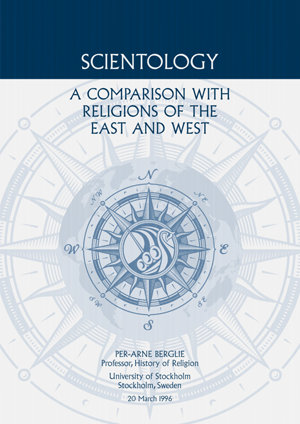CONTENTS INCLUDE:
ABOUT THE EXPERTISE
Scientology is a new religion. In fact, it was the only major world religion to emerge in the twentieth century and in only sixty years Scientology has expanded from its American origin points to take root throughout the world—with new Churches opening on a routine and regular basis. In this article from 1996, Professor Per-Arne Berglie compares Scientology with religions of the East and West. Dr. Berglie points out that every religious tradition on Earth was once considered new, implying that the difference between new religions and older ones may be simply a matter of time and social acceptance. He then examines numerous dimensions of Scientology’s religious character—for instance, the nature of auditing and training, awareness of a Supreme Being, a rich theology and path to salvation, ethical and moral teachings, ecclesiastical structures, and individual Churches themselves. Dr. Berglie concludes that while “great similarities with oriental religion exist, in matters concerning the view of human nature and formation of doctrine,” ultimately “The organisation and religious services are more reminiscent of the West and Christianity.” “Furthermore,” and more to the point, “Scientology appears fully as a religion and it is therefore natural to express the opinion that, in a community which has religious freedom, it should be provided with the facilities to satisfy the need of its adherents and members of the religious faith.” Indeed, the religious services delivered within Churches of Scientology are indispensable for the spiritual advancement of their parishioners, and Church visitors are always welcome.
BIOGRAPHY
Per-Arne Berglie, Ph.D., is professor of the history of religion in the Department of Ethnology, Comparative Religion, and Gender Studies at the University of Stockholm (Sweden). His research interests include Buddhism and folk religion in Southeast Asia and he has published prolifically on these topics in Swedish and English, including Gudarna stiger ned: Rituell besatthet hos sherpas och tibetaner (The Gods Descend: Ritual Obsession of Sherpas and Tibetans, 1983).

Scientology, Social Science and the Definition of Religion
by James A. Beckford, Professor of Sociology, University of Warwick, England

Social Change and New Religious Movements
by Bryan R. Wilson,
Emeritus Fellow in Sociology, Oxford University

The Church of Scientology
by Juha Pentikäinen, Marja Pentikäinen, University of Helsinki, Finland

The Relationship Between Scientology and Other Religions
by Fumio Sawada, Eighth holder of the secrets of Yu-itsu Shinto, the oldest religion in Japan; President, Ahlul-Bait Center

The Religious Nature of Scientology
by Geoffrey Parrinder, Methodist minister, Professor, Comparative Study of Religions, University of London

Religious Philosophy, Religion and Church
by G.C. Oosthuizen, Professor of Science of Religion, University of Durban-Westville, Natal, South Africa

Scientology a New Religion
by M. Darrol Bryant, Department of Religious Studies, Renison College, University of Waterloo, Ontario, Canada

Apostates and New Religious Movements
by Bryan R. Wilson,
Emeritus Fellow in Sociology, Oxford University

Scientology: An Analysis and Comparison of its Religious Systems and Doctrines
by Bryan R. Wilson,
Emeritus Fellow in Sociology, Oxford University

The Reliability of Apostate Testimony About New Religious Movements
by Lonnie D. Kliever Ph.D., Professor of Religious Studies

The Sea Organization and its Role Within the Church of Scientology
by Frank K. Flinn Ph.D. Adjunct Professor in Religious Studies

Brief Analyses of the Religious Nature of Scientology
by J. Gordon Melton, Baylor University, Samuel Hill, Gary Bouma, Irving Hexham

Congregational Services of the Church of Scientology
by Bryan R. Wilson,
Emeritus Fellow in Sociology, Oxford University

Is Scientology A Religion?
by Alan W. Black, Associate Professor of Sociology, University of New England, Armidale, New South Wales, Australia

Is Scientology a Religion?
by Dean M. Kelley, National Council of Churches

Religious Toleration & Religious Diversity
by Bryan R. Wilson,
Emeritus Fellow in Sociology, Oxford University

Scientology A Religion In South Africa
by David Chidester, Professor of Comparative Religion, University of Cape Town, South Africa

Scientology: A True Religion
by Urbano Alonso Galan, Professor of Philosophy and Theology, Gregorian University of Rome

Scientology: A Way of Spiritual Self-Identification
by Michael Sivertsev, Moscow Academy of Sciences

Scientology: A Worshipping Community
by Lonnie D. Kliever, Southern Methodist University, Dallas, Texas

Scientology and Contemporary Definitions of Religion in the Social Sciences
by Alejandro Frigerio, Professor of Sociology, Catholic University of Argentina, Buenos Aires

Scientology and Islam an Analogous Study
by Fumio Sawada, Eighth holder of the secrets of Yu-itsu Shinto, the oldest religion in Japan; President, Ahlul-Bait Center

Scientology and Religion
by Christiaan Vonck, Rector, Faculty for Comparative Study of Religion, Antwerp, Belgium

Scientology: A Comparison with Religions of the East and West
by Per-Arne Berglie, Professor of History of Religion, University of Stockholm

Scientology Its Cosmology, Anthropology, System of Ethics and Methodologies
by Régis Dericquebourg, Professor of Sociology of Religion, University of Lille III, France

Scientology – Its Historical-Morphological Frame
by Dario Sabbatucci, Professor of History of Religions, University of Rome

Scientology: Its True Nature
by Harri Heino, Professor of Theology, University of Tampere, Finland

Scientology: The Marks of Religion
by Frank K. Flinn, Adjunct Professor of Religious Studies Washington University
